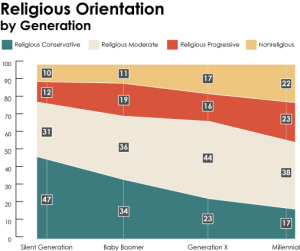 A new survey categorizes about 1 in 5 Americans as “religious progressives.” Catholics make up the largest proportion of that group in terms of religious affiliation, at 29 percent. (Mainline Protestants are next at 19 percent.) Religious progressive on average are younger (44) than the general population (47) and religious conservatives (53).
A new survey categorizes about 1 in 5 Americans as “religious progressives.” Catholics make up the largest proportion of that group in terms of religious affiliation, at 29 percent. (Mainline Protestants are next at 19 percent.) Religious progressive on average are younger (44) than the general population (47) and religious conservatives (53).
These numbers, and many more, are contained in the 2013 Economic Values Survey conducted by Public Religion Research Institute with the Brookings Institute. In the big picture, the survey identifies 19 percent of Americans as religious progressives, 38 percent as religious moderates, 28 percent as religious conservatives and 15 percent as nonreligious.
PRRI notes in its study that theologically conservative Americans have been studied far more than those who are theologically progressive. So it decided to look more closely at religious progressives, with the caveat that it is a difficult category to define across denominational lines. One of the findings was that religious people themselves differ greatly about what it means to be religious:
Nearly 8-in-10 (79%) religious progressives say being a religious person is mostly about doing the right thing, compared to 16% who say it is about holding the right beliefs. By contrast, a majority (54%) of religious conservatives say being a religious person is primarily about having the right beliefs, compared to less than 4-in-10 (38%) who say it is mostly about doing the right thing.
The poll seems to confirm analysis during the 2008 and 2012 presidential campaigns that religious progressives are gradually becoming more of a political force, even as they remain outnumbered by religious conservatives. Both sides face a difficult challenge in trying to attract supporters from outside their ranks, the survey says.
“The conservative coalition could fly apart if its emphasis moves too far from social issues and religion to economics,” it says, based on evidence that concern about social issues such as abortion is what draws many religious conservatives to support conservative Republicans, rather than the GOP’s approach to the economy.
That leaves religious progressives an opening to appeal to conservatives with religiously based economic arguments. But, the survey says, “The liberal coalition could fracture if liberals either ignore religion altogether or make strong appeals to religious voters that begin to offend the nonreligious in their ranks.” It adds: “Yet to build majorities, each side needs to reach out to voters whose views might make parts of their coalition uncomfortable.”
Chart: PRRI

